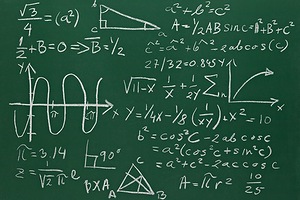Math can bring physical suffering

How much do you hate math problems? And the division in the column? Shot? Mathematical analysis?
For many people, the mere mention of such calculations causes horror and even, in some way, pain. Research by psychologists Ian Lyon and Sian Beilock showed that this is not an exaggeration at all: some people dislike mathematics because they feel the need to work with numbers is comparable to physical pain. People with a high degree of mathematical alert (high levels of mathematics-anxiety - HMAs), it causes physical suffering.
The above-mentioned scholars from the Chicago and Western universities, respectively, were interested in similar studies, which proved that sensations similar to physical pain in socially isolated people are proportional to the degree of fear and depression they experience . Mathematics, according to scientists, also causes a decent degree of anxiety in a person: “This is an ideal testing ground for investigating how physically safe situations cause a neural response similar to real pain sensations.”
Initially, the hypothesis was that it was the thought of the need to do mathematical calculations, and not the task, as such, is the trigger mechanism for fear of this procedure, which, in turn, causes painful sensations.
')
Scientists asked the experiment participants to answer a series of questions about how they feel before the upcoming math lessons, dividing them into two groups of 14 people (with high (HMAs) and low (LMAs) degree of mathematical anxiety, respectively). Criteria for determining its degree are based on the simple SMARS (Short Math Anxiety Rating-Scale) scale developed in 1972 specifically for this purpose. It should be noted that the fact of the existence of the SMARS scale for several decades already shows how acute this problem is in the world of psychology.
So, to test the hypothesis, 28 participants in the experiment received a number of linguistic and mathematical puzzles, during the solution of which their brain was subjected to MRI scanning. Before each subsequent series of questions, participants saw a light signal indicating the degree of complexity of the task and its affiliation (language or mathematics).
There were no differences in the neural response of both groups (HMAs / LMAs) before the lighter language and mathematical tasks, while in solving complex problems, people less disturbing with respect to mathematics showed significantly better results than the more disturbed subjects. This is quite logical: under stress, a person is inclined to be less effective in resolving situations that require serious mental activity.
Exploring the differences in brain activity in people with opposite anxiety poles, Lyon pointed out that before solving complex mathematical problems, participants with a high level of anxiety increased activity in the region of the insular lobe of the big hemispheres and the middle lobe cortex, after which they were much more difficult to solve . At the same time, less “mathematically disturbing” participants practically showed no neural response and easily coped with the task. What is important is the fact that these particular areas of the brain are responsible for pain. The results of the experiment showed that when participants with a high level of mathematical anxiety saw a light signal, indicating that it was followed by a complex mathematical task, the brain figuratively warned them that it would be painful now.
In conclusion, Lyon writes: “We received the first evidence pointing to the neural nature of mathematical anxiety. Previous studies of this kind focused mainly on social exclusion and claimed that it was an isolated state that caused a person to experience pain. However, the data of our experiment go much further and show that the very expectation of the upcoming unpleasant event entails a neural reaction, which is responsible for pain. ”
It is believed that the pain of this kind - an integral part of human nature, due to certain evolutionary processes. Lyon, nevertheless, considers it unlikely that "a purely evolutionary mechanism causes a brain's neural response to the prospect of doing mathematics, which, in fact, is a fairly modern cultural phenomenon." Such a conclusion can shed light on other psychological phenomena, in particular, the nature of phobias.
Since the stress of waiting, as it turned out, affects the efficiency and effectiveness more than the task itself, it makes sense to explore alternative approaches to teaching mathematics in school. It may also be worthwhile to consider simpler tax reporting processes. Often, the authorities are sounding the alarm, seeing the statistics of mathematical illiteracy among the adult population, but perhaps people are not to blame for not being able to concentrate on school mathematics lessons. Perhaps they were just frightened by the numbers themselves.
Source: https://habr.com/ru/post/157727/
All Articles